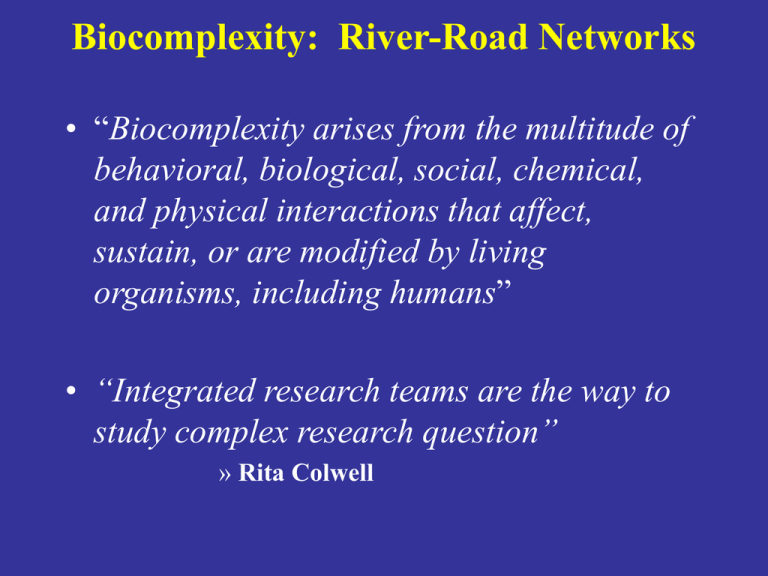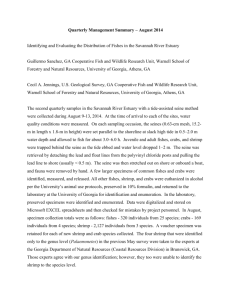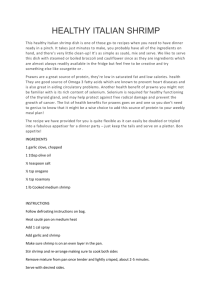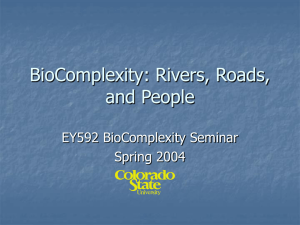Biocomplexity: River-Road Networks
advertisement

Biocomplexity: River-Road Networks • “Biocomplexity arises from the multitude of behavioral, biological, social, chemical, and physical interactions that affect, sustain, or are modified by living organisms, including humans” • “Integrated research teams are the way to study complex research question” » Rita Colwell Biocomplexity: River-Road Networks Biocomplexity: River-Road Networks • Overarching hypothesis: An integrated, individual based modeling framework will best predict interactive effects of humans on river landscapes than will individual physical, chemical, biological and social models River network models Drainage System Hydro Network Hydro Features Channel System From Maidment individuals populations communities ecosystems Xiphocaris • Particulate feeder / shredder / predator • 10-12 m^2 Atya • Filter feeder / scraper • 4-8 per m^2 •DOWNSTREAM DRIFT • ADULT HABITAT •UPSTREAM MIGRATION Culverts, Rio Grande, Backway school Bridge piles, Rio Espiritu Santo, El Verde Narrow squared culvert, Q. Tabonuco, near La Vega Large bridge, Rio Espiritu Santo, Jimenez Hypotheses • Aquatic species richness (fishes and decapods) will be: – – – – – higher within larger drainage areas. lower above waterfalls that limit dispersal (fishes). lower above more road crossings (fishes). lower below areas of high road density. lower in areas with a high percentage of agricultural and urban land uses. Gobiomorus dormitor, bigmouth sleeper presence 2 1 0 0 5000 10000 15000 distance from ocean (m) 20000 7 6 fishes 5 4 3 y = -0.0062x2 + 0.3116x + 1.2249 2 R2 = 0.651 1 0 0.0 5.0 10.0 15.0 20.0 25.0 Drainage area (km2) 30.0 35.0 40.0 Sqrt(Decapods) = 2.75 + 0.09*link – 0.27*area – 0.25*road density Predictors significant at 0.05 level R2 = 0.7982, p < 0.001 Shrimp density = 2.2 + .04(area) + .004(depth) - .014(macdens) R^2=0.34 600 Atya Shrimp 500 400 Observed 300 Expected 200 100 0 1 3 5 7 9 11 13 Pools 15 17 19 21 23 25 INDIVIDUAL BASED MODELING: SWARM Hypothesized Shrimp Movement Rules Rule set 1: Ideal free distribution , 9 shrimp /m2 8.5 9.0 8.8 Rule set 2: Elevation, Area Elevation > 400m , 18 shrimp /m2 Elevation < 400m , 6 shrimp /m2 Rule set 3 : Predator Rule set 4: Predator, Elevation, Area Best Predictors: Rule set: Predator, Area and nearest pool distance 600 Atya Shrimp 500 400 Observed 300 Expected 200 100 0 1 3 5 7 9 11 13 15 17 19 21 23 25 Pools ( upstream->) individuals populations communities ecosystems Physical models Social models Individual Based models Biological models Acknowledgements • • • • • • • • • • • • Felipe Blanco Dave Kikkert Ruth Kikkert Maria Ocasio Torres Enrique Marrero Coralys Ortiz Andy Crowl Paul Nicholson Kaua Friola Wyatt Cross Andrew Pike Kirk Sherrill




